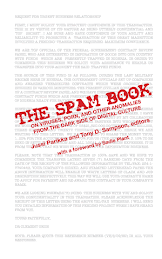Franco Bifo Berardi's Félix Guattari - Thought, Friendship, and Visionary Cartography was a great by-the-pool-book, and it made me convinced of the fact that Guattari is at least as important to media studies as is Deleuze. Ironically however, Bifo's points that seem closest to the core of media studies -- his meditations on the Internet -- are the least convincing, but his other remarks concerning what Guattari might call mixed semiotics, the refrain, the semiochemical, etc. are excellent in expanding media studies towards processes of subjectification. Bifo is polemic, aberrant and intriguing writer whose ideas often escape me yet I continue returning to them. I find this book on Guattari to be as much about Bifo, and hence it indeed shows how thinkers/writers act at best as catalysts; they take you to places where you would not have gone without them. Or as Bifo puts it: "rhizomatic thought is the cartography of landscapes yet to come...".
Bifo is not afraid of spreading the concept of the viral in his book, which seems to apply to his methodology as well. Contagion, viral spread and such concepts act less as metaphors than to demonstrate how such semiotic regimes as language act as mixed semiotics, always non-reducible to signification but spreading through a variety of regimes. Bifo paints the picture of Guattari as a materialist thinker -- a new materialist -- who is interested in the interplay and transversal relations of signification and non-signification. So virality refers to the mechanospheric dimension of reality that bypasses divisions between biosphere, noosphere etc. to underline that reality consists of the relations of heterogeneous elements. His materiality is the materiality of the singular -- not reducible to representations, contexts or other concepts borrowed from a more linguistic orientation of cultural analysis -- but one where the materiality of the event in its singularity is approached as a situated experience. There is one nice phrase that I want to quote from Bifo: "We generally say the the meaning of a statement depends on the context, but we must add that the meaning of the context in turn depends on statements that intersect it."
In terms of signs and language in its materiality, some of the implications reach towards software as well. I tried recently to write something about ethologies of software which tried to find some Deleuzian points of entry to code -- but ones which would not see code and the digital only as a reduction of intensities. Bifo's grasp of language in Guattari does this as well -- the focus on signs as always constituted of affects. Bifo quotes Paolo Fabbri on Deleuze and signs: "Any sign is the effect of the action of a body on another body, and therefore affect; and this variation of effects on a body provokes a variation in power, in affective sensibility: increase of power (joy), decrease of power (sadness." Now to transport this idea to software is the intriguing bit; and to see code not only as codification and regulated order, but as performance, temporality, and bodies of code in interaction. Furthermore, such a mode of analysis would see software as an assemblage - and part of other non-code related activities that sustain it (a media ecological approach.)
Materialism of language -- and the multiplicity of semiotic regimes is one key point that Bifo/Guattari offer. Another related to this is the conceptualisation of capitalism as a semiotic operator, a point worth quoting in length..:" the pervasiveness of the capitalist model no longer depends solely on an effect of abstract overcoding that manifests itself especially in the moment of exchange, but also depends on the technologically mediated integration of different moments of manufacturing: planifying moments, techno-scientific moments, informational moments, material moments, and so forth." In other words, capitalism act as such an operator that relays, channels, establishes and integrates processes of social production. This I find an important point in the sense that it does not negate capitalism to a dead vampire that only sucks on living energy, but as a mode of operationality. It does not mean a benevolence of capitalism, but it still points towards its energetic side.
Bifo is strong when he talks with Guattari on capitalism and its operations in the infoscape, also when he addresses the postmediatic affect and the psychic dimensions of capitalism. The idea of "schizoanalytic aesthetics" becomes a methodological guideline of sorts as well, where such an aesthetics is not focused on "beauty as an object of contemplation, but the way in which bodies perceive each other in the social field. In an era of displacement and migrations, of contaminations and integralisms, of nationalisms and aggression, an essential political problem is that of the semantics of social proximity, and thus of aesthetics." Such a rethinking of aesthetics internal to politics and even ontogenesis of relationality is what ties the project to other thinkers recently much discussed; Jacques Ranciere of course, but even A.N.Whitehead in the mode that for example Steven Shaviro takes him as a fresh alternative to a Heideggerian inspired post-structuralism. Of course, Guattari/Bifo are not as consistently "philosophical" in the sense of elaborating all details of their onto-politics etc., but this does not lessen their importance. Bifo makes the wonderful remark in the interview that is attached to the book that Guattari often sounded like a plumber when he wrote about flows, tubes, cutting and tightening.
Bifo, on his part, talks how his book was perceived by his publisher Luca Sossella as a book of poetry.
Yet, as said, the shortcomings of the approach are evident in the passages on the Internet. Some approaches have indeed put too much emphasis on the rhizomatic nature of the Internet, and critics have as much failed to see the emergence of much more interesting Deleuze-Guattarian inspired Internet studies. Hence Bifo's emphasis on the rhizomatic, distributed and hence revolutionary character of such networks fail to see the layered, also hierarchical protocols etc. that characterize the modern Internet.
Monday, 31 August 2009
Subscribe to:
Post Comments (Atom)








No comments:
Post a Comment